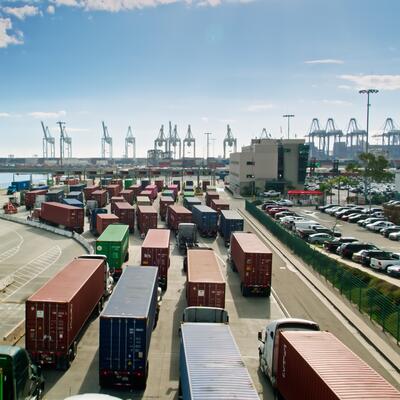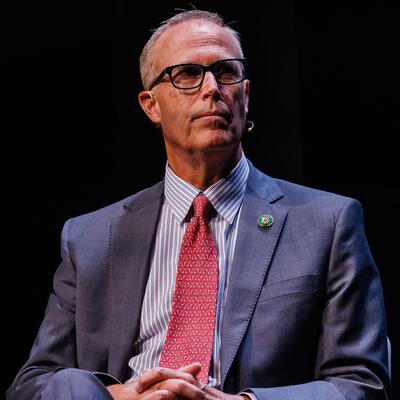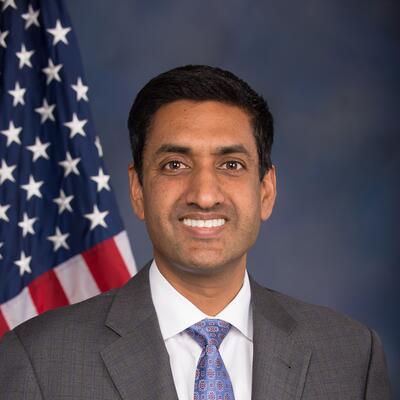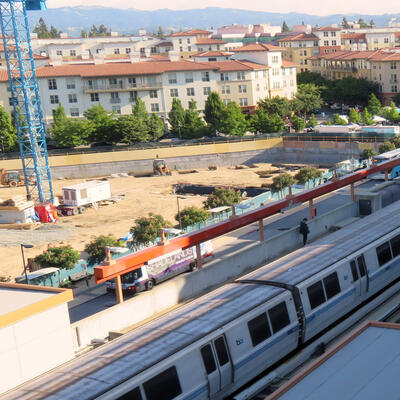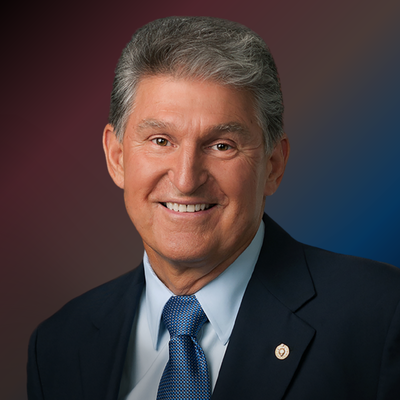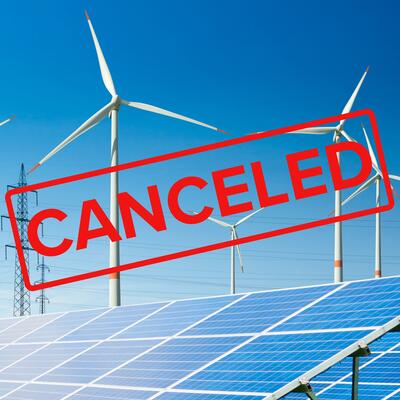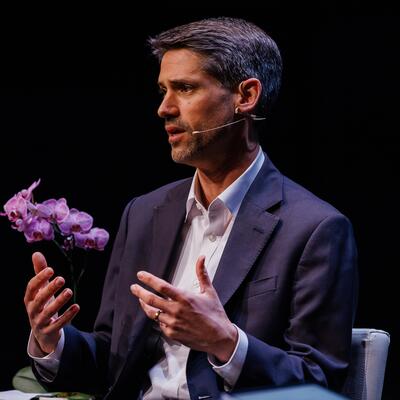
When California Dreams Hit Political Reality
Guests
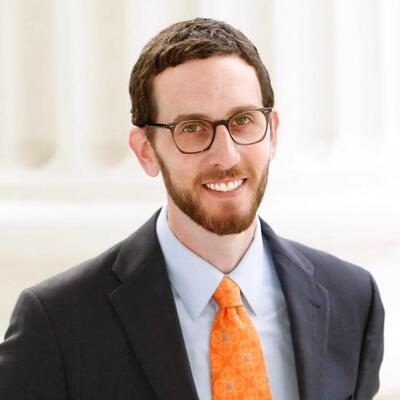
Scott Wiener
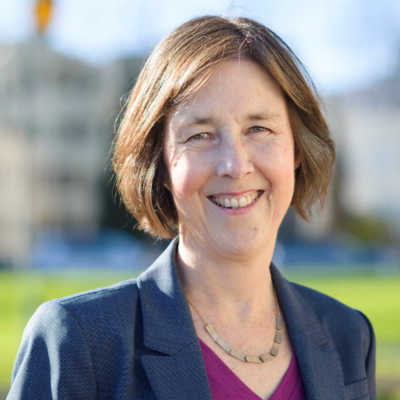
Nancy Skinner
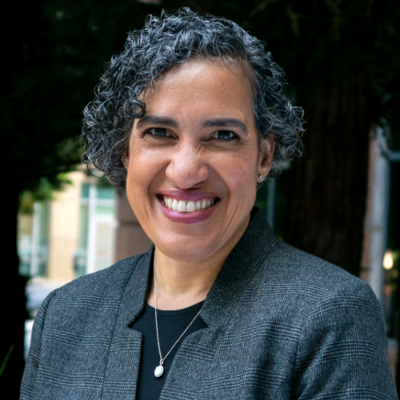
Liane M. Randolph

Mari Rose Taruc
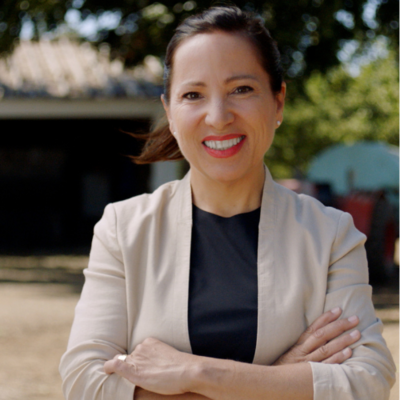
Eleni Kounalakis
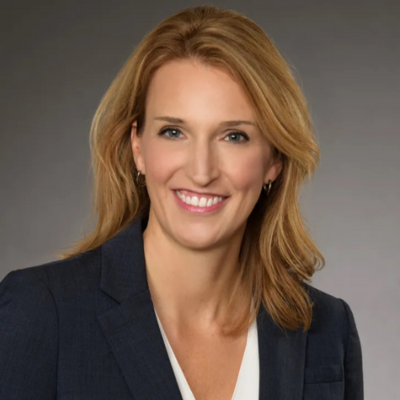
Jennifer Barrera
Summary
The Golden State has staked much of its reputation on its green credentials, with state leaders touting its role on the leading edge of global and national climate progress. And California is a huge force. As the fifth largest economy in the world, it sets the tone for a lot of national U.S. policies. California’s influence is especially apparent when other states adopt its pollution standards.
The state has been bullish on renewable energy, and its initiatives are starting to pay off. Gov. Gavin Newsom recently bragged that the state was running on 100% renewable energy for parts of 40 out of the last 48 days. California now has more than 10 gigawatts of battery storage on the grid. That means that renewable electricity can be banked for use when the wind isn’t blowing and the sun isn’t shining. And ten gigawatts is roughly equal to ten nuclear power plants — and all that capacity was built in just six years.
In spite of the doubts voiced by the fossil fuel industry and conservative leaders about whether California can meet its ambitious climate goals without wrecking the economy, the state continues to grow while reducing carbon emissions.
“You can have a progressive government that has progressive taxation and protects workers in the environment and still thrive and in fact, that sometimes can help you thrive,” says California State Sen. Scott Wiener.
Still, revamping a huge economy built on fossil fuels is hard and complex, particularly given the state’s current budget shortfall. But climate adaptation and mitigation remain a top priority for state officials.
“This is not a transition that's going to happen overnight. It's really about the trends and those trends aren't necessarily linear,” says Liane Randolph, chair of the California Air Resources Board.
The conversations in this episode were recorded in front of a live audience as part of San Francisco Climate Week. Climate One Co-host Greg Dalton led a series of events with state leaders exploring how California is trying to make good on its climate goals and address environmental injustice.
Episode Highlights
04:41 – CA budget challenges and electricity rates
08:00 – EV market and high speed rail in CA
14:30 – Second Trump presidency
21:00 – CARB emissions reduction plans
25:00 – Environmental justice priorities of moving away from diesel air pollution
31:00 – CA net metering policies
40:00 – EJ community wants more work from CARB to share greenhouse gas reduction funds and help retire gas plants
42:00 – What CA business community thinks of pace of energy transition
45:00 – CA has grown economy while reducing emissions
46:00 – Keeping CA competitive for companies
50:00 – Oil and gas role in transition as viewed by CA Chamber of Commerce
Resources From This Episode (2)
Full Transcript
Note: Transcripts are generated using a combination of automated software and human transcribers and may contain errors. Please check the actual audio before quoting it.Greg Dalton: I’m Greg Dalton.
Ariana Brocious: And I’m Ariana Brocious.
Greg Dalton: And this is Climate One. And today on the show, we’re going to focus on one state that has spent decades prioritizing climate action… my home state of California.
[music change]
Greg Dalton: I have spent most of my life here. I know we sometimes have a reputation for being virtue-signaling, wine-drinking, tree-hugging elites.That can be true, AND for decades California has been a national leader in environmental and climate protection.
Ariana Brocious: Yeah, apart from hogging nearly a third of the Colorado River water…
Greg Dalton: Oh, you Arizonan, you.
Ariana Brocious: I agree that California does a lot of good things. It was the first state to regulate automobile emissions and it started standards for energy efficient appliances.
Greg Dalton: A lot of people might not remember that back when Governor Ronald Reagan created the California Air Resources Board, in 1967. It started regulating air quality before the US EPA even existed.
Ariana Brocious: And because California is such a huge force – the fifth largest economy in the world, it sets the tone for a lot of national policies too. Like the fact that it sets stricter regs than the Clean Air Act, and car manufacturers basically have to follow them because other states have adopted California’s auto pollution standards too.
Greg Dalton: There's some truth that the future happens first in California. California enacted a low carbon fuel standard 13 years ago. Then Oregon and Washington followed suit. And now seven more states have introduced legislation to enact one.
Ariana Brocious: The state has been bullish on renewable energy, and it’s paying off. Here’s California Governor Gavin Newsom speaking at a press conference last week:
Gavin Newsom: 40 days out of the last 48. 40 of the last 48 days we’ve been running 100% clean energy on the grid. This is simply unprecedented. The fifth largest economy in the world, 11 days straight, breaking all records. 100% green. Wind, water, solar, I mean it’s just extraordinary. Proving all the naysayers wrong.
Greg Dalton: That IS a real accomplishment, though let’s clarify the California grid wasn’t running at 100% clean energy for the entirety of each of those 40 days – just for some portion of each of those days. But still, it’s a big deal. And it shows what is possible.
Ariana Brocious: Greg, I noticed that Governor Newsom was really intentional about saying California is proving all the naysayers wrong. Are there specific naysayers he’s talking about?
Greg Dalton: Well, there's a narrative by the fossil fuel industry and other leaders, and conservative leaders, who doubt California can meet such ambitious climate goals without wrecking the economy. And yet… California’s economy is proving those naysayers wrong – it is high cost but it’s ALSO robust. We keep growing while reducing emissions.
Ariana Brocious: And California hit another major milestone recently. The state now has more than 10 gigawatts of battery storage on the grid. Those batteries store renewable electricity for use when the wind isn’t blowing and the sun isn’t shining.
Greg Dalton: Ten gigawatts! That’s roughly equal to ten nuclear power plants.
Ariana Brocious: And it was built way faster than a single nuclear plant, which typically take decades.
Greg Dalton: California went from practically no battery storage on the grid to this much in just six years. So that’s really changing that old narrative that we need fossil fuels for when there’s no wind or sun.
Ariana Brocious: Last week was Earth Day, of course – and it was also San Francisco Climate week, which brings together leaders and the general public for more than 300 different events. Greg, you were there.
Greg Dalton: Yeah, it was exciting – there were events all around town. Fun and serious. Bike rides and tours of green homes, We even had a sustainable fashion show.
That was the fun part, there was also a bunch of serious stuff too. There were also people geeking out on all sorts of solutions to our climate challenge. And I led a series of live conversations, exploring how California is trying to make good on its climate goals. I’m excited that we’re going to share three of those conversations on the show today.
Ariana Brocious: Up first, your conversation with two Democratic state senators, Nancy Skinner and Scott Weiner. They chair the Housing Committee and the Budget Committee, respectively - positions with huge influence over the state’s climate policies.
Greg Dalton: We started the conversation talking about the challenges of the state budget, which is currently facing a shortfall expected to be tens of billions of dollars.
It goes this way, in cycles… In fact, Senator Skinner remembered that just a few years ago, tax receipts were filling government coffers, somewhat unexpectedly.
Nancy Skinner: We had this huge windfall of money. We're like, we're going to invest in more clean energy, more emissions reduction, more resiliency and adaptation for these actual impacts we're already feeling from climate change. But we've, we're going to have to cut back on those. We're just going to have to, but here's the good news. Biden's Infrastructure and Jobs Act is bringing so much money into the state for things like our electric vehicle charging, our water infrastructure, a lot of the things that we had used the budget to fund. So while it's not going to completely make up for it, fortunately, we at least have this great input of federal funds and just a shout out to Biden. You know, they call that the Inflation Reduction Act and the Infrastructure and Jobs Act, both of them.were great climate acts.
Greg Dalton: They were. Senator Wiener, at the center of those laws is electrifying everything, stopping burning things basically and taking wind and sun and putting it in our homes. But there's a lot of pressure on legislators, now saying, whoa, the prices to business prices to consumers. And so is that really putting the electric transition at risk?
Scott Wiener: I think if we don't get a better handle on electricity on power, it's going to make the transition harder and it's already doing this. It arms the climate deniers, the right wingers, with an argument that look, you don't have a reliable enough grid and President Biden once again delivered on this in terms of grid modernization. There's funding in those two laws to do that and we need to take advantage of it and we need to streamline and accelerate our permit process, which we did some of last year. We have to do a lot more. It should not take years to get that permitted. It needs to take a matter of months.
Greg Dalton: Senator Skinner, electric rates in northern California have increased 28 percent in three years. And those hikes are funding climate related projects, some good things. It's also some bills coming due for things PG&E didn't do. But their track record is not very good, you know, on deferred maintenance, et cetera. So who should bear those costs? Because consumers are screaming. Should the company, should some of the shareholders pay some of those costs?
Nancy Skinner: The PUC has an incredibly hard job. A really hard job. But as consumers of electricity with those kinds of rates, and we look at the type of revenue above the profits that PG&E is making and what they're paying their executives, it's kind of hard to accept. Like, what are we doing? Why are we paying these people this amount?
Greg Dalton: 17 million, I think it was. Yeah.
Nancy Skinner: But here's some other aspects of it. The wildfire situation, we all experienced it. We, in the Bay Area, we were in nighttime in the middle of the day because of the smoke. It's so damaging to our health. And so a portion of our rates are now paying PG&E to do the type of wildfire mitigation. Hopefully, in the next couple of years, we can reduce that. We don't have to use rates for that because again, the Biden administration bills are going to bring money for wildfire over a five year period. Very significant amount of monies for mitigation, meaning for vegetation management, for all the kinds of things we're now using rates for.
Greg Dalton: There's been a lot of negative coverage of electric vehicles recently. They're still meeting, on the high end of, of what models suggested, but there's the rate of growth is slowing. Although, Chinese drivers bought 5 million EVs last year. So EVs are definitely taking off in China. So how big a setback is this? You know, this sort of this, the narrative really of slowing growth of EVs?
Scott Wiener: Yeah, I mean, there is a narrative. California is doing well overall with EVs. We have much higher uptake than other parts of the country.
Greg Dalton: 20-something percent…
Scott Wiener: Yeah, we're, we're, we have a lot of work to do in terms of the charging infrastructure, but we're making progress there as well. And we do need to electrify the whole fleet. And until we get there, we need to make sure that all of our cars are more fuel efficient. I also, I, I do just want to say, and I am not always popular for saying this, that EV is still a car. and although I do want all cars to be zero emission, that is a very important goal. I also don't want us to keep our addiction to everything has to be about driving a car. Everything has to be designed around the needs of cars. We've messed up so many cities in redesigning, uh, to just favor cars. EVs weigh more than combustion engine cars and don't pay gas tax.
Greg Dalton: So they, they damage the roads.
Scott Wiener: So we need to move to a vehicle miles traveled fee so you know, everyone is paying. But we have to invest in our public transportation systems, massively invest. We have to have long term stable funding to have more transit, not less. Rail system in the state of California, which we don't have. And Amtrak, no offense, doesn't count because it takes twice as long to take a train from the Bay Area to L.A. as it does to drive. It's absurd and embarrassing that we do not have statewide rail service in California, and we have allowed right-wing obstructionists to win the PR battle of high speed rail, the train to nowhere. Well, LA and San Francisco and Fresno and San Jose are not nowhere. And we need to just get it done. We have to course correct on that and make that happen.
Greg Dalton: Senator Skinner, a few days ago, a private company broke ground on a high speed rail line called the Bright Line that will run from Southern California to Las Vegas. They aim to be operational in time for the 2028 Olympics in Los Angeles, but our state run program is struggling and still, what, a hundred billion dollars short of what it needs to finish. Should we plow forward?
Nancy Skinner: We should plow forward. I've been to Japan, I've been to Spain, I just was in France in the fall, looking at high speed rail in all of those countries. It's efficient, people use it, it's much lower carbon than air travel, it's, yes, and we'll get there. Sure. we can say I love driving my car, I always I just want to be in my own car and I want to be around everybody else. But we're really dependent on it because of our land use decisions in the city in this state over a good 50, 60 year period, and most of us live in areas where to get to work or to get to our kids to school or to do our, whatever services we need, we have to drive. We have, we're far away. Our housing is not dense enough. This housing land use transportation conundrum is a huge contributor to our climate crisis. And it is very much why we're facing many of the challenges that we're facing today.
Greg Dalton: A lot of parking lots near transit that's been turned into housing. You want to do more. Is that happening fast enough?
Scott Wiener: It is not happening quickly enough. And we've, we, we've planted the seeds with a lot of good regulatory reform to make it easier and faster to get permits to, to really force cities to zone for a lot more housing. There are still challenges. So in San Francisco, the fees that are charged for development in San Francisco, it's almost 200,000 per housing unit. There are other cities that it's more like 20,000 per housing unit. And so we continue in some cities like San Francisco to make strides and improvements, but there is still work to do.
Greg Dalton: Senator Skinner, the state and national policies are under attack, you know, a lot of pushback against climate and energy policies, Washington's measure is facing a ballot measure there to change what some Washington did with the support of BP, by the way. Canadian Prime Minister Trudeau's re-election bid is facing headwinds because of a nationwide carbon tax. New York Governor Kathy Hochul is considering watering down that state's price on carbon pollution. How do you see the national picture? Because California is often seen as leading on this, and then there seems to be some real headwinds these days.
Nancy Skinner: Well, inflation is affecting that. I think inflation is a concern beyond just the U.S. and of course, don't minimize the role of the fossil fuel companies in blaming climate policies on their outrageous gas prices. Don't even get me started. But let's look at California again. We are the fifth largest economy in the world. Yes, prices are higher. There is a cost of living here that is higher than a lot of other places but that was real even before we started aggressively acting on protecting the climate. Now our polls show that Californians are still very much in support of action on the climate crisis, they know it's real, there's no denying of the science, but when people are feeling pinched in their pocketbook, that always –
Greg Dalton: That's where it breaks down. Yeah, I'm for it, but what's it going to cost me, right?
Nancy Skinner: And so far, Californians have been in alignment and I hope that we can stay there and we're trying to do our best. I mean, this is why we care a lot about electricity rates. We don't want them to get much higher or higher at all. But as we know that as we electrify, we get all the vehicles on electricity that means you're going to have to generate more electricity and have more transmission and such. So these are challenges that we're going to have to navigate very carefully.
Greg Dalton: Senator Wiener, the Heritage Foundation has a very ambitious plan to really not just double down, triple down on fossil fuels in the event of a second Trump presidency. A lot of things will come under attack. California's waiver under the Clean Air Act to have cleaner air standards, et cetera will really come under attack with a conservative Supreme Court sitting there to back him up. What are you thinking there in terms of how California can continue as a climate leader in a second Trump presidency?
Scott Wiener: I mean, just sort of backing up. The key thing to do is to win elections and make sure he doesn't come back in and make sure that Congress doesn't go in a negative direction. Elections have consequences. I just want to put it out there…if they, god forbid, take the White House and Congress, we'll be playing intense defense but let's not get there.
Greg Dalton: Right.
Nancy Skinner: And we cannot undo the damage that a Trump presidency could do in terms of all of the climate progress that's been made in the U.S. We could never even the best defense that California put so nobody should get any illusion about that.
Greg Dalton: Is the focus on climate reducing or elevating the power of fossil fuel companies because they kind of have a lot at stake, you know, it's life and death for them. Is their power waxing or waning in Sacramento?
Nancy Skinner: It does not mean death for them. Corporations in our country, they diversify, they'll go wherever they can make money. And I'm like, it's their fault that they haven't figured it out yet, those oil companies, how to make money on everything else. California is still the fifth largest economy in the world. Even though we're only that small portion of emissions, our leadership has set the standard. The fact that we started on utility grade batteries, now the rest of the country is following us, and so is the rest of the world. Our beginning of EV sales, sure, they might be a little lower right now, but we set the trend. All the auto manufacturers are making EVs now. So we have to keep setting that trend and the oil companies should diversify and figure out how to be profitable in a climate protective economy instead of in a climate damaging economy.
Scott Wiener: We know that California continues to attract companies here, companies that move here, companies that start here, companies that grow here. So you can have a progressive government that you know has progressive taxation and protects workers in the environment and still thrive and in fact, that sometimes can help you thrive.
Greg Dalton: Right. So I'm a policy nerd and I think of, you know, think about a lot of, you know, policy is really important. A lot of the climate conversations, very technical, et cetera. I've also learned we need to teach people on different levels, emotional levels, their whole selves. So where do you go personally to try to connect with people on a deeper emotional level to convey the stakes and urgency of climate?
Nancy Skinner: I have not encountered that many people here in California that don't feel the urgency. It's more they feel overwhelmed. They're not sure what priorities and of course we have to just survive. We have to live day to day. Now I feel my challenge and everybody's is to give everyone hope to act. We need hope so I look at the circumstance and I look at technology, which I've not always been a fan of. I'm not a Luddite, but I'm not, but I look at these technological breakthroughs. Here's an example. Today, Governor Newsom announced a new battery storage facility up in Winters. These are big batteries that allow us, you power them with the solar energy, and then when the sun's down, you use that big battery to power the grid. We now have, in California, 10,000 megawatts, and I'll make it easier to understand. That's five Diablo Canyon power plants worth. We have five Diablo Canyon power plants worth of battery storage that gets –
Greg Dalton: That's a nuclear power plant. Yeah.
Nancy Skinner: Of battery storage that gets powered by the sun and then can be plugged in when we need it and the sun's not shining. That's hope. So I see technological breakthroughs. I don't know what all of them will be yet, but I see those and that's what gives me hope. And I hope to convey hope to everyone else.
Greg Dalton: That was California State Senators Scott Weiner and Nancy Skinner. Today’s show is all about how California’s moves to cleaner cars and power might impact the rest of the country.
Coming up, for a long time, people were concerned that the state’s solar incentives were favoring high income residents. Then a new plan was put in place. Now some say the state solved one problem, and created another.
Mari Rose Taruc: When communities of color were finally getting in the door to create a more equitable solar program, that's when they cut off the compensation for the those who are installing solar.
Greg Dalton: That’s up next, when Climate One continues.
Ariana Brocious: Please help us get people talking more about climate by sharing this episode with a friend. And we’d love to know what you think of the show. Please give us a rating or review. You can do it right now on your device – and it really helps people find the show. Thanks!
Greg Dalton: This is Climate One. I’m Greg Dalton.
Ariana Brocious: And I’m Ariana Brocious.
Greg Dalton: California’s Air Resources Board is the most powerful climate force you’ve never heard of. It’s mostly referred to by its acronym, “CARB.” It was created in 1967 by Governor Ronald Reagan, and it’s responsible for regulating emissions from factories, trucks and cars, dairies, and more. It touches most of the California economy. And in my view, the head of the agency is one of the most influential climate leaders in the whole country, right behind the head of the US EPA.
Ariana Brocious: We invited CARB Chair Liane Randolph and Mari Rose Taruc of the California Environmental Justice Alliance to be a part of SF Climate Week. You talked with them about cleaning up the air in all parts of the state, including communities near freeways and warehouses with lots of diesel trucks spewing toxic pollution.
Greg Dalton: Liane, researchers at the group Next 10 calculated that the state has reduced emissions on average, about 1.5 percent a year between 2010 and 2021. And to reach our 2030 goals, we'd have to reduce emissions by four and a half percent a year, basically three X from what we've done so far. And we've already done the easy stuff. Right? Now the harder stuff comes. So how can we multiply by three X emission reductions when we're getting to the harder work?
Liane Randolph: One of our responsibilities at CARB is to adopt the climate change scoping plan that gets updated every five years. And when we did our most recent update at the end of 2022, we were really clear that here's the suite of strategies, here are the things that need to happen, but unless they actually happen and unless the deployment happens, we will not reach our goals. So deployment is absolutely critical. We need the renewable energy that is going to support the transition to move as much as we can to electricity. Our market-based programs need to get more stringent. We are working on that right now. We are looking at both our low carbon fuel standard program and our cap and trade program, looking at how they can achieve more reductions. And we are continuing to consider our regulatory strategies. One thing that's important to recognize is that it's not just about the market-based programs, it's about the critical regulations that drive emissions reductions. It's about advanced clean cars too. 100 percent new car sales, zero emission by 2035. It's about advanced clean trucks and advanced clean fleets. Those rules together will transition the heavy duty sector to zero emission by 2045, with new sales being zero emission by 2036. And it's those rules that will really benefit communities that live along freeways, that live near ports, that live near the incredibly growing warehouse industry.
Greg Dalton: Let me jump in there. Truckers say they can't afford it. Truckers say that electric trucks, and I saw electric trucks driving to L. A. recently. I was like, so excited. There they are, electric trucks on the road. And they cost double of a diesel truck. And so, sounds great, but you know, unless you're going to pay truckers a bunch of money, 250,000 to buy a truck that they could buy for 125,000, how's it going to happen?
Liane Randolph: A few things I would say. First of all, the cost will continue to go down. We are already seeing reductions in battery prices as we anticipated when we adopt the rule and consider the rates of adoption, that battery technology will continue to reduce in price. Incentives do help. The total cost of ownership is a really important conversation to have with people who are buying these trucks. You know, you have a higher upfront cost, but you have lower maintenance costs and lower fueling costs. So, this is not a transition that's going to happen overnight. And it's really about the trends and those trends aren't necessarily linear. You know, you will have some sectors that have breakthroughs and move forward and then other sectors that are maybe going slower than you think they're going to go. The key is that we keep moving forward with all of our strategies and we get the rules in place that ensure that the companies and industries will be making the transition and will continue to move forward.
And I'm just gonna say one more thing about that, which is the incredible support from the federal government. When we adopted our scoping plan, we did not model in the Inflation Reduction Act or the Infrastructure and Jobs Act because they were brand new and we didn't have time to put it into our modeling. So the way I think of those laws is they put wind in our sails. You know, we had a plan. We could show that that plan reduces greenhouse gas emissions and still sustains a strong economy. And now we have even more support. They have heavy duty vehicle incentives as well.
Greg Dalton: Mari Rose, most people who receive Amazon packages, come to the Commonwealth Club, listen to this show, don't live in a diesel death corridor or near a port or near a warehouse where there's a lot of concentration of diesel trucks. So tell us how important this getting away from diesel, which has many carcinogens, creates all sorts of health problems. How important is this?
Mari Rose Taruc: So when, if my kids live next to the freeway and I'm spending multiple times a year taking them to the emergency room for exacerbated asthma, like what, what is the cost of your child's health? You know, those are the types of ways that we approach these climate and environmental policies from environmental justice communities, from our health, the health of our families. And so what will it take for us to change our ways, the polluting economy that we belong to. Like sometimes it does feel like really big to make that change in that transition. But here we are actually integrating our health ideas into climate and environmental policy. And this is why when we say we have to move from those diesel trucks, it's not just good for environmental justice communities. It's good for everybody when we reduce the pollution coming out of diesel trucks. And it's not that we don't have the technologies or the solutions for that, or even the money. There's a lot of free money, actually, that I will say, CARB is giving away to corporations through free allowances through these market mechanisms. And the environmental justice community is actually a community opposed those kinds of measures, or ways that CARB has designed our climate program and where the funds flow. Like if anybody needs free money, it's low income communities, who's paying too much now for skyrocketing electricity rates. We need to actually move funds smartly, especially to the people who need them the most. And when we're talking about affordability, if I'm earning 30,000 a year, my affordability for my electricity costs is different than if I'm earning 2 million a year. And so we need to be talking about the economics there.
Greg Dalton: Let's get to electricity affordability. First, I want to have Liane respond to this point that, you know, is CARB handing out corporate welfare through cap and trade?
Liane Randolph: Well, the free allowances are set by statute based on the fact that they are industries are trade exposed. And when the most recent statutory cap and trade update was passed, basically, the legislature said, we're going to consider all industries trade exposed. And and so, you know, they sort of –
Greg Dalton: You can't change that. The legislature did it.
Liane Randolph: Right, right.
Greg Dalton: And this goes back to trying to get business on board, not punish them too hard because we want business to be part of this transition.
Liane Randolph: It is, you know, it, it is extremely, it's sort of extremely challenging kind of making this transition because one of the other criticisms we get is, Oh, well, if you increase the cost on companies to comply, they raise their prices, they raise their gas prices, they raise their consumer product prices, and that has an impact on affordability as well.
Greg Dalton: So they pass it through. Sure.
Liane Randolph: They're passing through. So, you know, as a regulatory agency and as an agency sort of trying to figure out how to move the needle on climate through both a regulatory process and through market based strategies. You know, we're always trying to strike that balance of ensuring that we are continuing to move the transition forward, but recognizing that we have to be mindful of the impacts of our rules on the functioning of the economy and you know, we are legally obligated to do that for every rule. We have to do an economic analysis that fully accounts for the impacts on the economy. And one of the ways we account for those impacts is by pointing out the public health benefits because unfortunately, when you have to do an economic analysis, you have to look at public health benefits, not from the perspective of a scared parent in an emergency room on a Saturday night, but from the perspective of how much money is it going to save? The health care system and the reality is it will save money in the healthcare system. And so the larger economy benefits from our regulatory work, and we need to continue to tell that story. But we also have to be mindful of the fact that there are jobs and livelihoods that depend on a strong economy. And so we need to make this transition in a way that helps support those jobs.
And I'll just sort of throw out one last little point, which is, I think it's really important when companies think about making this transition or when investors think about investing in new technologies and new companies, that one of the questions they ask is, What kind of jobs are you providing? Are you providing actual full time jobs with benefits, with reasonable salaries or are you doing the venture capital as cheap as possible race to the bottom? I think it's really important that everyone involved in this transition asked themselves that question.
Greg Dalton: Most companies pay their employees as little as possible, right? That's how it works. I want to move on to the affordability of electricity. Mari Rose, California kneecapped rooftop solar allegedly because the prices paid for rooftop solar sent to the grid was favoring wealthy people and leaving out low income people. There was sort of this bougie bias. The new program known as net metering 3.0 was supposed to bring rooftop solar to renters and others who had difficulty affording it before. Do you think California's new rooftop solar math is delivering as promised? And, you know, why?
Mari Rose Taruc: Environmental justice communities, millions of people across California want to see clean energy on the rooftops. The thing is, not all of us own our rooftops, right? And so especially from environmental justice communities, most of us are renters. So how do we also make sure that our solar programs are reaching renters? And so, the California Environmental Justice Alliance, where I work, we have introduced bills in the legislature and have gotten laws where we're going to dedicate, funding on, um, affordable housing, and create a program for community solar so that, that our, you know, community centers, our healthcare centers, other community buildings can also provide that kind of clean energy in the neighborhood.
What's happened with the net energy metering and the rooftop solar redesign is that when communities of color were finally getting in the door to create a more equitable solar program, that's when they cut off the compensation for those who are installing solar. So it happened at the wrong time. I think there needs to be an equitable redesign of net metering, and they need to take into account how to make it equitable.
Greg Dalton: That was what this was supposed to do. Are you saying that the Public Utilities Commission that sets these rates is kind of, has a history of being pretty cozy with industry? Are you saying they're kind of cozy cozy?
Mari Rose Taruc: That's right. Yeah. I mean,
Greg Dalton: Again?! I thought we were supposed to fix that.
Mari Rose Taruc: Well, which agency is allowing all our skyrocketing rates from the investor owned utilities?
Greg Dalton: 38 percent increase in three years.
Mari Rose Taruc: Who is blocking our community solar program from getting implemented the right way? The CPUC. And so there's a lot that, especially Governor Newsom could do, to make the CPUC more responsive to the 99 percent of Californians in the state. And I think that that could, because they're the ones making decisions and they need to, to be more accountable to, to people and, and, and less about these private utilities.
Greg Dalton: You used to be on the public utilities commission –
Liane Randolph: I was about to say,
Greg Dalton: So,
Liane Randolph: I think I, I can, I can weigh in here. I guess I would say a couple of things. So full disclosure, I voted on NEM 2.0, which was the last sort of –
Greg Dalton: Net energy metering.
Liane Randolph: Previous, the, yeah. And at that time, and I said this from the dais, I made it very clear because the reality is that the NEM program requires utilities to buy electrons that they could buy for dirt cheap from utility facilities and pay a retail rate to individuals who have rooftop solar. And that historically that program has benefited people like me, who could afford to put rooftop solar on their roof and compensated me for electrons that I didn't need to be compensated for. And the purpose was the right purpose. The purpose was to build a rooftop solar industry and to get it going. The challenge is that the economics of solar have shifted. And as I said, when I voted on NEM 2.0, this cannot go on forever. The industry has to figure out a way to make its product sustainable. More attractive, more accessible without the cost shift to the rate payers who can't afford to put rooftop.
Greg Dalton: Starting subsidies over, take off the training wheels. You gotta be a big, put on your big boy pants and survive.
Liane Randolph: Right. Full disclosure, I have not read the community solar proposed decision that is currently out, so I can't comment on that.
Mari Rose Taruc: It's bad.
Liane Randolph: But, you know, but, but I just think it's really important to remember that we are trying to make this transition in a way that is as fair and equitable as, as possible and things that we used to do, like giving, you know, on the hood rebates for people with no regard to income or the MSRP of the vehicle or providing full retail compensation for electrons that could be purchased for much cheaper, that's just not equitable, and we have to move away from that model.
Greg Dalton: I want to ask a philosophical question. You know, there's a question about how to approach fossil fuel companies. Some people would say fossil fuel companies are the villains. Let's, you know, slit their throats and, and, you know, and, and do away with them. And others would say, no, Tame the beast. Let's lure them into this economy. Let's, you know, encourage them. And hydrogen is a way to do that, right? A lot of the fossil fuel companies and big industrial companies favor hydrogen 'cause it fits into their business model. So are you in the slit the throat or kind of tame the beast kind of approach?
Liane Randolph: Well, okay. So our scoping plan calls for a 94 percent reduction in fossil fuel use. Okay. Right. That is our goal. Our goal is to stop relying on fossil fuels. And so the way we think about that is, you know, for instance, in the hydrogen hub process, that application is for renewable hydrogen. It is for hydrogen produced from renewable energy. And the state is putting a lot of effort into building that market and building that supply so that we don't have to use fossil fuels for hydrogen. So that's one thing I would point out. The second thing is a lot of the work we do is about reducing the demand for fossil fuels. It is about building that renewable energy. It is about deploying zero emission appliances. It is about deploying zero emission trucks all the way from class two delivery vans up to class eight trucks. And we, even in our most aggressive projections, it takes time to do that. It takes a long time. These vehicles last for 15, 20 years.
Greg Dalton: Mari Rose, something that I think has been overlooked that happened this year, that's really interesting is, a ban on gasoline powered lawnmowers, you know, leaf blowers, that sort of thing, which I think, industry pretty much got on board with pretty quickly. I didn't see the kind of pushback. It's often, you know, immigrants, low skilled laborers who are using those, you know, those, those equipment. Yeah. Gardener, right? Who are breathing it, et cetera. You know, I know one who's like, I don't like carrying a gasoline around in my truck because it smells. I'm breathing the fumes when I'm driving around my leaf blower. They electric ones sound much better than those we, you know, leaf blowers, gas blowers, you know, how big a deal is that? And are there cost considerations there? Cause you know, again, you know, electric leaf blower costs more than a gasoline one up front.
Mari Rose Taruc: This is where there's free money from, from the Greenhouse Gas Reduction Fund from polluters that can actually be used as incentives for a transition for especially like workers like our gardeners. Our immigrant gardeners, et cetera, and there's, there's money there. And that's where we think, you know, the equitable use of the funds that are in the greenhouse gas reduction fund could go. So –
Greg Dalton: But how many gardeners know how to get money from CARB, right?
Mari Rose Taruc: Well, this is what we tell CARB is that you need to actually work in the, you know, with communities to do the marketing because the community based organizations know where, our families who work in, in these gardens and we, we could do a really good job of, of marketing. So that's kind of the partnership that we have been calling for with CARB and other agencies is that we're on the ground. We have relationships with the people that you're trying to serve. Let us help, help co create these programs. And you know, you were talking leaf blowers, but my main campaign actually out of CEJA is to help retire the 200 gas fired power plants in the state. Talk about that as a big project that's consequential to our future and how we're going to solve climate change is that California is like pumped with methane gas and these 200 power plants all across the state that are harming us. And we are trying to figure out the transition from those dirty power plants into clean energy sources that we can even own.
And after many years of advocacy, we got a good decision from the CPUC in their long term planning for gas retirement, to actually slash emissions by half in the next 10 years. So imagine 200 power plants in the next 10 years where we're going to get emissions reductions, half of that capacity. We want the power plants in environmental justice communities to be retired first.
Ariana Brocious: That was Mari Rose Taruc, with the California Environmental Justice Alliance and Liane Randolph, Chair of the California Air Resources Board.
Coming up, what role could fossil fuel companies play in transitioning away from… fossil fuels?
Jennifer Barrera: They are investing in a lot of these clean energy technologies. They also have an amazing workforce, an amazing skilled workforce that needs /// to be recognized for being partners in this space.
Ariana Brocious: That’s up next, when Climate One continues.
Greg Dalton: This is Climate One, I’m Greg Dalton. In spite of California’s commitment to clean energy, it’s home to a lot of oil and gas production too. That means the industry has powerful lobbies in state politics and lots of economic pull. During SF Climate Week, I invited Jennifer Barrera, president and CEO of the California Chamber of Commerce, and California Lieutenant Governor Eleni Kounalakis to talk about the energy transition. Here’s Jennifer Barrera.
Jennifer Barrera: There's no question about the direction in which we're moving. We're moving into a clean energy economy. And I think the businesses of the past are not the businesses that are here today. I think a lot of our members, a lot of the businesses in California are embracing it and are planning for it.
Greg Dalton: But there's questions about sort of pace and cost. It’s that, yeah, we all agree, you know, on the clean energy future, but we're only putting 1 percent of our money into those investments. So is that right? Pace and cost or where the differences are.
Jennifer Barrera: Well, I think it's, certainly both of those are significant when we talk about this discussion. And when you'd say costs, of course, you know, going and changing kind of how we energize this economy is going to be a cost. It's obviously building those renewable energy sources, whether it's building, developing our infrastructure to make sure that we're able to have a reliable grid with the energy sources. I mean, all of these things are going to cost money and we need to figure out how those costs are going to be borne.
So there's that side of the cost equation, but there's also the side of the cost equation of course, if we do nothing and what happens to our economy, our businesses are part of the communities, just like everyone else. They are subject to the same changes we're seeing in the climate as well, with regards to the wildfires and the weather patterns and things of that nature. So there's that cost if we do nothing and all of these costs are going to be born in our state by our taxpayers, by our businesses, by our consumers. And that is a sensitive subject. We do polls on a regular basis at Cal Chamber just to kind of get a sense of where the voters are in California. And no question voters are definitely concerned about climate change. They're definitely supportive of clean energy. But then when you start asking them the follow up questions about how much are you willing to pay that,
Greg Dalton: Yeah, right.
Jennifer Barrera: …that starts to taper off a little.
Greg Dalton: Yeah, right, we all want things that we don't want to pay for them. Eleni, the California budget is still in flux right now, but it is a bad budget year. Maybe not as bad as we thought a little while ago. But it's clear that we're facing a major deficit. The governor's proposed some cuts to climate programs and there's real concern about that. So how concerned are you about the budget situation affecting California's climate leadership?
Eleni Kounalakis: So first of all, Greg, let me just say what a privilege it is to be here during Climate Week at Climate One. And I really just want to underscore for everyone who's here and who's listening, how extraordinary it is that we just heard from the head of the California Chamber of Commerce, Talking about the intention of California and the direction in transitioning to a carbon free energy future and that that is the future of our state in terms of our values but it is also the future of our economy.
Greg Dalton: We don't hear that from the U. S. Chamber of Commerce.
Eleni Kounalakis: We don't, and I suspect, Jennifer, that that would not be a common thing you would hear from most states. But California is different. And it isn't just hopefulness. It is proven. So if you look at the numbers for the state of California, over the last 24 years, since the year 2000, the population of the state of California has grown by about 17%. And our emissions have come down by about 16%, all while the California economy has grown by about 68%.
Greg Dalton: We can grow the economy and not grow emissions. That decoupling.
Eleni Kounalakis: We can grow the economy. We can grow the population while we are cutting emissions. This is remarkable. And I think more than anything, companies whether they're large companies, whether they're small businesses, whether they're opportunities for minority owned businesses to have a piece of it, whether it's foreign direct investment coming into California. There is enormous opportunity to invest in the The transition to carbon free energy future. We are the largest consumer market in the country. People are ready and willing to try new technologies again. I think the electric vehicles, the great example of that, as well as the fact that two times the amount of venture capital of any other state is allocated here in California.
Greg Dalton: A lot happens here. Jennifer, a lot gets invented here. Solar panels, semiconductors, Tesla started here, right? But then these companies tend to go elsewhere to manufacture to develop their technology. Some of that's, that's cheap labor. So, you know, talk about the competitive context, because some people would say that whoever controls these clean technologies, controls the 21st century. And right now, that's China.
Jennifer Barrera: Yeah, well certainly we are competing obviously on a national perspective with other states, but of course we're competing in the international markets with the clean energy technology, and what is being developed. And we are an innovative state and we're very proud of that, so we need to maintain that competitiveness. And that innovation and we need really to focus on how we can keep these companies in California. Keep them here, but also attract them here. We want them to develop these technologies here. We want them to manufacture these products here. That's great paying jobs here in California. We want to attract more of it. How do you do that? We are a high cost state. There's no question about it. We have higher obviously taxes, I know the governor talks about that quite often, but when you compare us just on a percentage basis We're higher in costs with regards to our taxes, our housing is expensive. We have, you know, higher costs for our consumers.
So knowing that and knowing where we're starting from, what other things can we do to be competitive? Well, one of the biggest things that we are supportive of and pushing for is we have to create an environment where they can get things done. We need to expedite our processes with regards to permitting and siting to make sure that they have the opportunity to site their projects here, build them in a timely manner and aren't delayed because delay costs money and when they can go to other states and get it done where they're welcoming them and identifying the sites available for them to develop some of these facilities, that's a competitive advantage that I think we can address.
Greg Dalton: Eleni, California automakers have signaled the end of newly made gasoline, internal combustion engines, diesel and gasoline, even Stellantis, which has been a laggard, maker of Dodge and Jeep kind of lined up with California recently on their policies do you support the policies that move away from oil and see the end of the internal combustion engine.
Eleni Kounalakis: Well, I think that what we know is that this is a transition and transitions are not always, you know, linear.
Greg Dalton: Or smooth?
Eleni Kounalakis: Yeah, or smooth. I mean, it is a process, but look at where we are. You mentioned Tesla, Tesla received billions of dollars in tax credits and rebates for buying them and all kinds of programs for it to get off the ground.
Greg Dalton: Elon Musk doesn't talk about that much but government, they wouldn't be here if the federal government didn't –
Eleni Kounalakis: really pushes back, but you know, true, Elon Musk is not very grateful, but California did not ask for gratitude when we set those programs up.
We wanted to seed innovation. And it worked so today about half of the electric vehicles in the United States are on the roads here in California. About 25% of the vehicles sold in California last year were zero emission vehicles and the governor signed an executive order that by 2035 all the cars sold in california need to be zero emission vehicles. So we seeded the ability for a company like Tesla to take advantage of the opportunity here, and that has completely transformed the automotive industry. California should take credit for that.
Greg Dalton: That wouldn't have happened in detroit if detroit had been had their way it wouldn't have happened.
Eleni Kounalakis: No question about it.
Greg Dalton: California is a big oil producing state. Many people don't realize, you know Chevron and other oil companies are a big part of the Cal chamber what's your position on sort of this sun setting of internal combustion engines, which it's not is happening with a policy prod and and gm has said that voluntarily, without any policy, they're going in the same direction. So is the chamber on board with that?
Jennifer Barrera: Yeah. We do have oil and gas companies as a part of our membership and I think my perspective on it and what I, I hope, others will, see is that these companies are energy companies at the end of the day, and they are going to be a part of the conversation here in California for the foreseeable future. We are not in a place yet where we can operate our grid and support our transportation infrastructure without them. They have the resources to invest in a lot of this clean energy. They are investing in a lot of these clean energy technologies. And I think they need to be recognized for being partners in this space. base. They also have an amazing workforce, an amazing skilled workforce that needs to have recognized for the skills that they contribute to this. They should have a seat at the table. I think they do. But this is a part of the discussion as well as how do we take that existing workforce and start transitioning them and shifting them to these other technologies and making sure that they have a place to go if that is the direction the state is heading.
Greg Dalton: On geothermal, which is actually an area that's growing and that's an area where actually there are transferable skills from oil and gas though on the investment side, yeah, they often say that they're investing in clean energy, but when you look at when you look at their numbers it's like one or two percent of their capital expenditures are actually going toward renewables. Eleni, I'd like to ask you, how has climate change personally affected you?
Eleni Kounalakis: Well, I represent 39 million Californians. It's my job to see how climate change is affecting everyone in our state. Extreme weather has wreaked havoc on the state of California. We have had some of the most severe wildfires, not just in the recorded history of California, but even researchers that can go back and look at, you know, rings on trees, that this is an unprecedented, biblical, I mean, you, you talk to firefighters and they will tell you about fire tornadoes, up in Paradise, the terrible loss of life up in Paradise. The fire traveled at a rate of a football field per second, throwing debris a mile ahead. And so we have learned a lot, you know, four of the most catastrophic wildfires in our history have happened, sorry, six of them just in the last four years. So, personally, I can tell you, I was here in San Francisco several times when we had air purifiers going full blast in our apartment and we still couldn't breathe. And it was terrifying. The other thing is that it is seriously impacting our water supply.
So we had five years of drought, which I'll tell you, two years ago before the atmospheric rivers started coming in January around, I guess, December of 22, January of 23. Up until then, we were looking at major, major problems with the lack of water. And then it started raining one atmospheric river after the other. And so, what the vision has to be, in my opinion, from what we've learned just in the last few years, is we must invest in our storage system so that we can manage –
Greg Dalton: Does that mean more dams?
Eleni Kounalakis: It means in, so there's one reservoir that people are very hopeful about the Sites reservoir. It is a major –
Greg Dalton: So it is bigger.
Eleni Kounalakis: We have all kinds of existing reservoirs that could be expanded in order to be able to basically hold more water. But the other thing that we know a lot more about is groundwater recharge. So being able to get water in the ground during the rainy times, either by basically just spreading it all over, flooding fields, or actually putting it right back into the aquifer. These are really the areas that we're going to have to invest.
Greg Dalton: Eleni, you work on the state lands commission, which deals with sea level rise, you know, this is kind of slowly eroding all sorts of problems. It's going to cost a lot of money to armor the coast. And if I want to put a seawall and you're next door my defense can hurt you or my other neighbors. So how are we going to approach a sea level rise and how, again, back to how are we going to pay for it?
Eleni Kounalakis: Well, a lot has been done, and, uh, the Ocean Protection Council has finished a study recently on some of the different ways. You can not just harden with seawalls, but with, you know, even setbacks, landscape, various things, but right. But we're looking at the potential, I mean, we know this is coming. We've already experienced it. So it's going to have a cost. There's no question about it.
Greg Dalton: Eleni Kounalakis and Jennifer Barrera, thank you very much for sharing your insight. Let's end it there.
Eleni Kounalakis: Thanks, Greg. It was a pleasure.
Greg Dalton: On Climate One today, we’ve been showcasing the live interviews we recorded during SF Climate Week, at the Commonwealth Club. You can hear even more of those conversations by going to our website, climate one dot org, or subscribing to our podcast. And If you live in the Bay area, make sure you sign up for our newsletter to get info about future live events – we’d love to see you here.
Ariana Brocious:Talking about climate can be hard — AND it’s critical to address the transitions we need to make in all parts of society. Please help us get people talking more about climate by giving us a rating or review. You can do it right now on your device. Or consider joining us on Patreon and supporting the show that way.
Greg Dalton: Brad Marshland is our senior producer; Our managing director is Jenny Park. Ariana Brocious is co-host, editor and producer. Austin Colón is producer and editor. Megan Biscieglia is producer and production manager. Wency Shaida is our development manager, Ben Testani is our communications manager. Jenny Lawton is consulting producer. Our theme music was composed by George Young. Gloria Duffy and Philip Yun are co-CEOs of The Commonwealth Club World Affairs, the nonprofit and nonpartisan forum where our program originates. I’m Greg Dalton.
